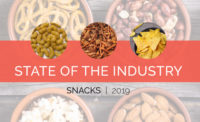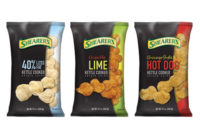
By Marina Mayer
When the folks at Don Pancho purchased an old-fashioned tortilla facility three years ago, their goal was to create a plant that catered to East Coast customers. This facility, located in Halifax, N.C., was to contain all the bells and whistles, so to speak, including state-of-the-art equipment, enhanced technologies and eco-friendly features.
It was dubbed the “Jewel of the South.”
Now, it is the prototype of a tortilla-exclusive facility that was crafted by tortilleros for the specific use of making tortillas, says Ricardo Baez, president of Salem, Ore.-based Don Pancho Authentic Mexican Foods.
“It has all of the elements that are important for our team to manufacture in a safe, clean, open environment so that we can maximize all of the latest equipment and really create that vision where you mesh the latest infrastructure of a building with the latest infrastructure of state-of-the-art equipment, and mold it into the confectioneering and the art of making tortillas,” Baez says.
However, the art of making tortillas is only half the battle. According to Catalino “Cuco” Quirarte, national director of tortilla plants, it’s the art from the operators who make the product that counts.
“Not everything is in the book,” he adds. “Making manufacturing equipment and parts or any other type of equipment, things to use, is okay, but manufacturing food, it still needs some form of human passion and a team that is completely diversified based on their strengths.”
Snack Food & Wholesale Bakerywas invited to tour the 85,000-sq.-ft., HACCP-certified facility that pumps out more than 80 million lb. of corn and flour tortillas per year.
Aesthetic values
Just like any precious stone, this recently opened facility has been cut and polished to simultaneously run a variety of 5- to 15-in. corn and flour tortillas.
The plant is divided into three manufacturing rooms to segregate allergens, and is home to two bulk wheat flour silos that hold 80,000 lb. each.
At the time ofSnack Food & Wholesale Bakery’s visit, the facility was shelling out 10- and 12-in. flour tortillas and wraps and 6-in. white corn tortillas.
The flour tortilla room, for example, allocates four super-mega tortilla lines that produce nearly 30,000 tortillas an hour, Baez says.
The single-file, 130-ft.-long flour production line starts with a mixer to make the dough, which then travels into a ball mixer, up an elevator and is then dumped into a hopper. From there, the dough drops through four long cylinders into the proofing system where it remains for about eight minutes at 70°F.
From the proofing system, the dough enters the presser, running 25 pieces for 20 cycles a minute. Then the tortillas are released into a three-pass baking oven for 26-30 seconds at 400°F.
The tortillas then convey into the cooling system for about three minutes at 45-52°F, depending on the environment of the room, Quirarte says.
After the cooldown process, tortillas pass through a vision system that rejects defects based on set specifications. Then, the tortillas travel through the counter stacker, which automatically counts and stacks the tortillas, then pushes them through a mark belt system that synchronizes the stacks. Once the stacks are synchronized, the tortillas enter the packaging system, which takes the product through a metal detector system that rejects foreign materials, especially metal, for food safety purposes.
After being packaged, finished products travel through a heat sealer that heat seals the plastic packaging before it enters a code dater and metal detector. Then, the product is sorted and manually placed in boxes. The boxes then transfer through a box-tape sealer, another code dater and then a palletizer.
The whole process is approximately 20 minutes from the beginning of the line to the end, Quirarte says.
“Producing in a straight line has some pretty good advantages because you’re not turning the product in many directions. It’s just a straight shot,” he adds. “The concept of straight production lines is that way we don’t sacrifice the quality in terms of making too many turns. We make these buildings so long so that way we can bake and package in the same room.”
The corn room encompasses up to six tortilla lines that churn out thousands of dozens 3.5- to 8-in. tortillas an hour. Line 1, for instance, is 110 ft. long. Corn flour comes in 2,000-lb. sacks that empty into the hopper and transfer into an upstairs scale. The scale releases the corn flour into the mixer, which blends water and other ingredients. The batch goes through a three-sheeter system that cuts and forms the dough before it heads into the oven where it bakes for 25 seconds at 450°F. Scraps from the sheeter filter back into the machinery to be reused.
Finished product transfers from the production floor and into a 78°F temperature-conditioned room where it is shipped out of five docks on a daily basis.
“Some customers require us to take the product out and place in a 38°F environment, so that facility is going to be next door and we’re going to transferring product into that one,” Quirarte says.
In addition, close to 25,000 lb. of raw materials enter through a three-dock station on the other end of the building and are stored in an air-conditioned room. The facility also houses a small ingredients batching room where scientists create recipes and conduct research and development.
Quite the gem
Nearly 10 years ago, Don Pancho, formerly known as Puentes Bros., formed a relationship with Reser’s Fine Foods, based in Beaverton, Ore. Reser’s, a distributor ofStonemill Kitchensdips andMrs. Kinser’scheese spreads, salads, side dishes and more, maintained a strong distribution center for tortillas, thanks to its own line ofBaja Cafétortillas, salsas, taquitos, enchiladas and hand-rolled burritos.
Fast forward to now, Don Pancho is a separate entity of Reser’s that operates independently under the same umbrella food family, Baez says. Doing so, however, has enabled Don Pancho to leverage Reser’s purchasing power and connections in exchange for its expertise in tortilla manufacturing.
“We live and breathe tortillas, so that’s how we upgrade our business,” Baez says. “A lot of our distribution is either done with us direct with our direct accounts that we have or if it makes sense for the consumer when they want to consolidate vendors or want to save money or to be more efficient, we’re able to bundle loads with Reser’s salads or other products.”
Together, Don Pancho and Reser’s share about 125 routes and main-line distributors, he adds.
“We have dedicated tortilla distribution for those who only want to engage in tortilla distribution and we have our own trucks who deliver to specific geographic locations,” Baez says.
Don Pancho also operates according to a just-in-time manufacturing model, providing just-in-time shipping and distribution. The computer system in place automatically downloads finished product into inventory and then tags each order to be shipped.
“We have the ability to receive just-in-time relevant data to make better decisions and control the flow of our operation,” Baez says. “To me, it increases visibility, it increases accountability, but it also gives us the ability to react on the spot. We’re able to track all of the materials. The whole process in place has instant visibility. That’s an asset to have at our disposable.”
Another asset is Don Pancho’s in-house leadership training program, designed to train operators how to lead teams, lines and more.
“One of our philosophies is that if we don’t grow the people to lead and lead by example on the floor, we just cannot grow,” Quirarte says. “Part of our goals is to train our personnel to lead in training other people. Every month, there’s a leadership meeting and training sessions for two hours. Every lead on the floor must participate in order to hold their positions.”
Don Pancho’s facilities are audited once a year by Silliker or Cook & Thurber, and conduct twice-a-year mock recalls. Meanwhile, quality control technicians are continuously walking the floor, collecting samples and checking weight, moisture and such to ensure that the attributes of each batch meet product specifications.
The facility also possesses an assortment of eco-friendly features.
For instance, the packaging areas are separated with a ventilation system that compresses the heat to the roof to help with air flow and ensure product integrity. The entire building encompasses censor-driven, energy-saving lighting systems as well as combustion systems where fresh air blows and mixes with gas to provide better ventilation. Food scraps are delivered to local farmers to feed their animals, and Don Pancho installed a company-wide recycling program that collects and recycles paper, cardboard and corrugated boxes.
“When I think of a tortilla plant that has all of the elements in place, this plant has that, and this is going to be the model for the plants that we’re going to use, in the future,” Baez says. “There’s synergy in every single thing that we’ve done so that we can create the best possible product in the best possible environment fusing the technology with the craftsmanship of baking tortillas. That’s what makes this plant the Jewel of the South.”



